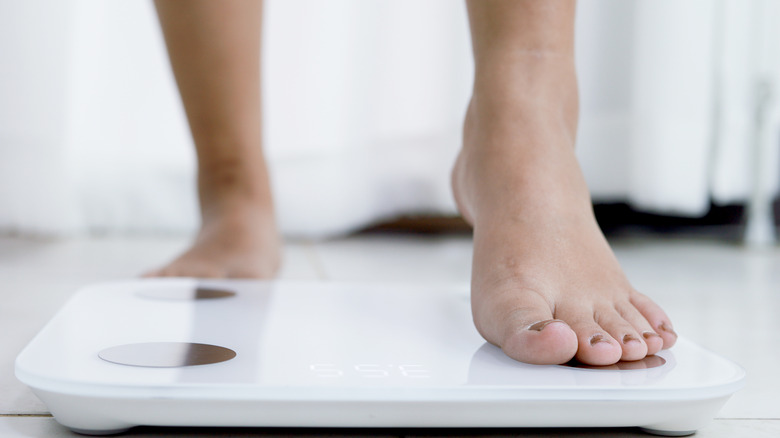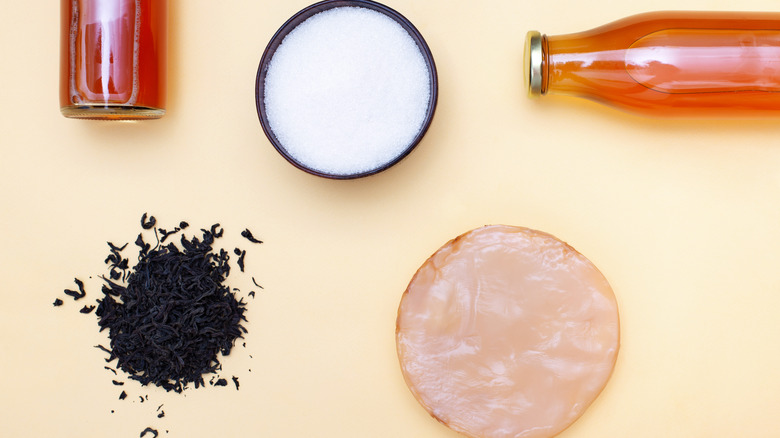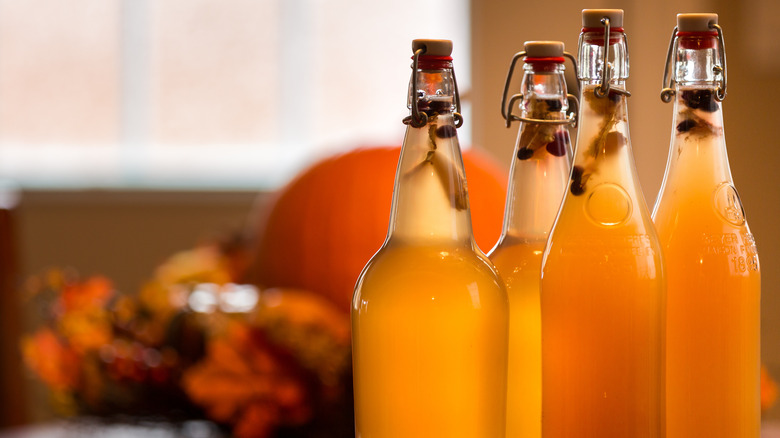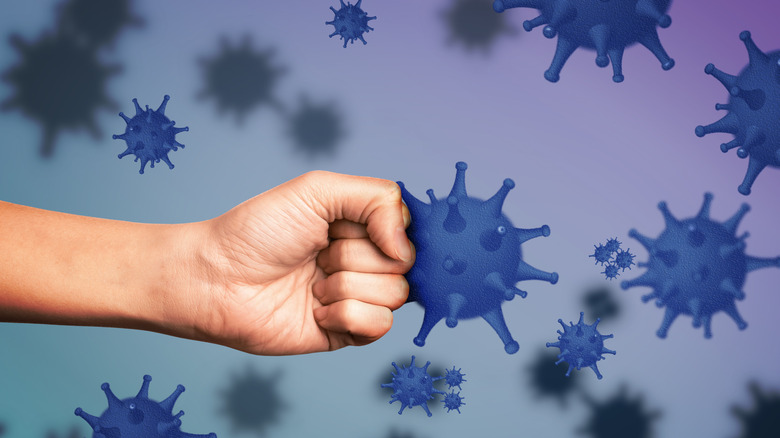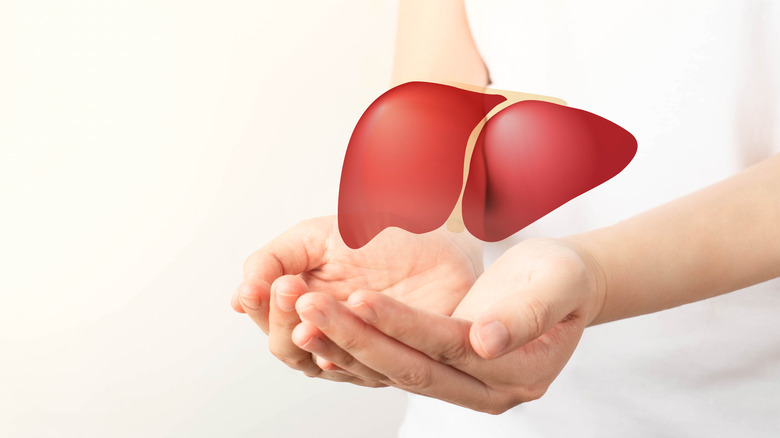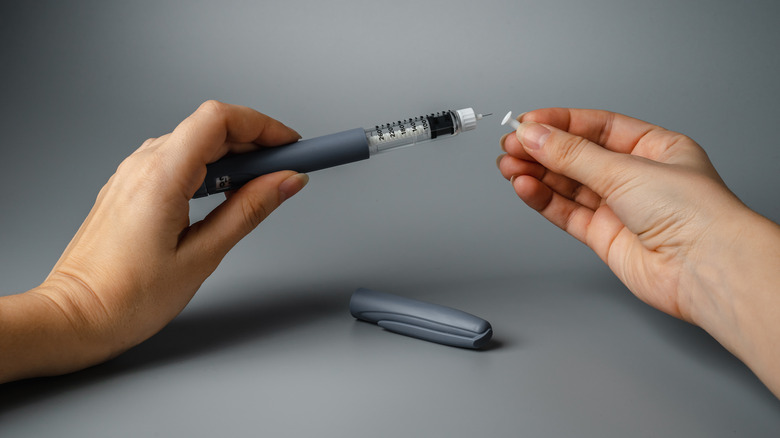What Happens To Your Body When You Drink Kombucha Every Day
If you've been on the planet for any length of time, chances are you've probably heard of kombucha by now. The drink is said to have originated in ancient China in the year 220 B.C. It is made by fermenting sweetened green or black tea for approximately two to three weeks, whereafter it is bottled and then left to ferment for an additional one to two weeks, which is when it begins to carbonate (via Forbes).
Brewers often add fresh fruit or fruit juices to the brew while it's fermenting to give it additional flavor, and additions such as strawberry, ginger, and basil are not uncommon. According to Healthline, a number of acids that provide a vinegar-like taste and a small amount of alcohol are produced during the fermentation process, giving kombucha a one-of-a-kind flavor.
Love it or leave it, this fizzy fermented beverage does boast a significant amount of health benefits that have people hooked. On the other hand, there are a few things to take into consideration when imbibing kombucha — especially in large quantities and over a prolonged period of time.
Your mental health could improve
It might seem hopeful to think that a deliciously sweet and fizzy drink could also work toward improving your mental health, but scientific evidence abounds to prove this theory has merit. The star ingredient in kombucha that gives it its mood-boosting properties is probiotics. Healthline reports that when making kombucha, certain strains of healthy bacteria are added to the brew, which ends up forming a large disk at the top. This disk is known as the SCOBY, which is short for symbiotic culture of bacteria and yeast, and contains the aforementioned probiotics.
The presence of probiotics, or "good bacteria," in your gut can significantly improve its health; however, if the balance is off it can present significant challenges, one of which is the state of your mental health. Healthline explained that the "gut-brain-axis" is what connects your central nervous system (including your brain and spinal cord) to your gut, and probiotics can influence this connection. Probiotics help via the production of certain neurotransmitters that are known to control your appetite, mood, and sleep, according to the site, and also positively influence cognitive functioning and the way you respond to stress.
Your digestion could improve
While the effects of kombucha on your digestion might not be as dramatic and immediate as taking a laxative, the cumulative effects of drinking kombucha can assist in major changes to your gut microbiome which can improve your overall digestive health (via Healthline). Probiotics may help symptoms of irritable bowel syndrome (IBS), which is known to cause bowel irregularity as well as bloating and stomach pain. Furthermore, kombucha may also be able to reduce inflammation in the gut, as well as improve the amount of nutrients that your gut absorbs.
If you're feeling backed up, kombucha could be a source of relief. A study published by the Archives of Gerontology and Geriatrics observed a group of elderly adults and saw a significant improvement in bowel movements by 10% to 40% when taking probiotics compared to the placebo group. Another somewhat indirect way kombucha may be able to help your digestion is that it can help you stay hydrated. Dehydration is a primary cause of constipation, and by drinking kombucha you are helping your body to stay hydrated, thus helping to soften stool (via Healthline).
You might lose weight
Kombucha is made from either green or black tea — and both teas carry their own specific benefits. Green tea, in particular, has properties that make it somewhat of a superstar when it comes to your health. Fortunately, kombucha made with green tea carries those same benefits.
According to Healthline, green tea "is one of the healthiest beverages on the planet." When it comes to weight loss, there are a number of ways it can help. For one, the caffeine in green tea is a stimulant that can assist in burning fat and improving exercise performance. Secondly, green tea has a high number of antioxidants, one of which is called epigallocatechin gallate (EGCG), which is known for increasing your metabolism. Healthline explains that some of the compounds in green tea can assist the fat-burning process by improving the efficacy of fat-burning hormones, specifically one called norepinephrine. EGCG assists in this process by preventing the enzyme that breaks down norepinephrine, thus increasing its presence in the body, and promoting the breakdown of fat.
But you could gain weight
Now that you've heard the good news, it's time to hear the potential drawbacks kombucha may have on your waistline. If you find yourself hooked on the 'buch with no signs of slowing down, it's important to remember that kombucha is not a calorie-free beverage.
While some kombucha brands may not have a ton of calories, others can boast as many as 120 per bottle (via Healthline). If you are drinking the beverage daily and even have a hankering for more than one bottle a day, it's no surprise to know that those calories will add up quickly. Furthermore, while kombucha is good for your body, it's not necessarily filling, which means those calories are taking the place of other more nutrient-dense foods that could help fill you up and keep you from overeating.
Furthermore, kombucha's deliciously sweet taste is a result of, you guessed it: sugar. Again, the makeup of different kombuchas will vary from brand to brand, but Healthline explains that some kinds contain as many as 28 grams of added sugars per bottle. While being high in empty calories, sugar promotes insulin resistance, which can lead to increases in the body's fat storage, according to Healthline.
You might get the jitters
Although the caffeine in tea may assist you in your efforts to lose weight, there's another more unpleasant side effect caffeine can have on your body: the jitters. While the caffeine content in kombucha is not going to rival a shot of espresso, it is possible for its effects to still be felt, especially if consumed in large quantities and in those who are sensitive or not accustomed to consuming caffeine.
According to Healthline, only a third of the amount of caffeine that's present in the original tea will remain in kombucha due to the fermentation process. That is to say, if a cup of green tea contains 30 milligrams of caffeine, the kombucha will contain only 10. However, the amount can vary and even increase depending on how the kombucha is made. If the tea is left to steep for longer, this could increase the caffeine content, according to the site. Likewise, the shorter the fermentation time, the more caffeine you are likely to be imbibing in the final product. Some of the side effects of too much caffeine include anxiety, insomnia, and rapid heart rate.
Your risk of heart disease could decrease
Another one of the potential benefits of adding kombucha to your diet is the positive effect it could have on your heart. According to the CDC, heart disease is the leading cause of death for men and women of all ethnicities in the United States; one person dies every 36 seconds of heart disease in the U.S. Heart disease can develop as a result of a buildup of plaque in your arteries, which is from high levels of "bad" (LDL) cholesterol (via Medical News Today).
In a study published by Pharmaceutical Biology, scientists fed rats a high-cholesterol diet and then fed them both kombucha supplements and a tea called Camellia sinensis. The scientists noted that in the rats who were fed the kombucha, their "bad" cholesterol levels decreased by 36%, and that their "good" cholesterol levels increased significantly. Furthermore, Healthline explains that the green tea in kombucha helps to prevent the "bad" cholesterol from oxidizing in the blood, which can also help prevent heart disease.
Your risk of cancer could decrease
Along with heart disease, cancer is one of the leading causes of death worldwide. While there are many treatment options, science has also turned its attention to kombucha as a potential line of defense to help prevent the spread of cancerous cells (via Healthline).
In a study published by the journal Microorganisms, scientists studied the effect of kombucha prepared from green, oolong, and black tea on colorectal cancer cells. The study found that all of the kombuchas were "found to display effective toxicity against Caco-2 colorectal cancer cells." The study noted that the previously mentioned ingredient in green tea, EGCG, was particularly effective in preventing the multiplication of cancerous cells, and that certain components in black tea, such as malonate and vitexin, were also toxic to cancer cells. Furthermore, the study found that the polyphenols found in the tea could also prevent the mutations of genes, which could potentially lead to the formation of cancer.
Additionally, a study published by Biomedicine & Preventative Nutrition observed the anti-cancer benefits of kombucha and saw that the beverage significantly decreased the "survival of prostate cancer cells by downregulating the expression of angiogenesis stimulators," expressing that it could be effective in both treating and preventing the disease.
Your vaginal health may improve
This benefit may seem out of left field, but science has shown that regular consumption of kombucha may actually contribute to an improvement of vaginal health. Yet again, the magical ingredient in kombucha responsible for this positive side effect is probiotics.
Dr. Iffath Hoskins, clinical associate professor in the department of obstetrics and gynecology at NYU Langone Medical Center, told Refinery29, "Probiotics help to stabilize vaginal pH, so as to allow the healthy bacteria to thrive in that environment." Experts at the site go on to explain that each vagina has a unique pH that can change based on personal factors such as your menstrual cycle, sexual activity, and diet, however when that balance is "off," you are more likely to experience yeast infections and bacterial vaginosis.
Dr. Hoskins explains that while consuming kombucha may not eliminate bacterial infections, consuming probiotics regularly can help reduce the risk of experiencing either type. While probiotic supplements are available over the counter, experts explain that edible (or drinkable) probiotics are more effective, as the supplements can be negatively impacted by stomach acid before they reach the gut.
Your immune system may improve
A healthy immune system is key to preventing a variety of different sicknesses, and there are several things you can do — including drinking kombucha — to help maintain its optimal functioning.
Probiotics help the body to produce certain natural antibodies that help fight bacteria and viruses (via Healthline). Furthermore, one study explained that 70% of our immune system is located in our gut, and that the aforementioned antibodies are produced there as well (per Everyday Health). Because your gut is so strongly connected to your immune system, the health of both are intertwined.
A study published in the Archives of Medical Research studied the potential use of probiotics as an antiviral agent, as a way to help modulate the immune system, and to potentially fight COVID-19. Scientists from the study explained that the gut's microbiome plays a strong role in regulating lung diseases, and that a lack of bacterial diversity in the guts of elderly patients may actually be contributing to increased COVID-19 fatalities in that population. The study concluded that probiotics do play a strong role in regulating the immune system, and that supplementing with them could in fact "reduce the severity of COVID-19 morbidity and mortality" by boosting immunity. Nevertheless, more research is needed.
Your inflammation could decrease
Everyone has experienced some level of inflammation in their lives whether they are aware of it or not. According to the Cleveland Clinic, inflammation is your body's immunological response to an intrusion such as a virus, bacteria, or chemical. When your body becomes aware of this intrusion your immune system activates inflammatory cells to "trap" the bacteria, virus, et cetera, and begin the healing process. Unfortunately, this healing process can be uncomfortable and lead to symptoms such as pain, swelling, itching, and more.
So how does kombucha help relieve the symptoms associated with this process? According to Everyday Health, the tea that kombucha is made from contains what are called polyphenols, a type of antioxidant that is known to reduce inflammation. Experts at the site explain that adding gut-friendly foods to your diet, such as kombucha can also help reduce inflammation in the intestines, which has been linked to some gut disorders such as irritable bowel syndrome and other inflammatory diseases. Some scientists believe that the inflammation may be triggered by an imbalance of gut bacteria, which can be solved by consuming probiotic-rich foods and drinks such as kombucha.
Your liver health could improve
When thinking about taking care of your vital organs, your liver may not be the first thing that comes to mind. Your heart, lungs, and brain, maybe — but how often do you stop to think about how you're treating your liver (aside from the morning after having one too many)?
According to Healthline, our livers play a vital role in our day-to-day health by producing proteins and cholesterol as well as breaking down toxins such as the aforementioned alcohol. And for those with liver toxicity, consuming kombucha regularly may be beneficial. The study published by Pharmaceutical Biology that found kombucha could help lower cholesterol levels also found that the beverage assisted in reducing toxic chemicals in the liver — at least in rodents. The rats that were fed a diet of kombucha saw a 55% reduction in thiobarbituric acid reactive substances — which contributes to liver toxicity — compared to the rats that were fed a cholesterol-rich diet. Additionally, the study found that other toxic activity in the liver was reduced by 33% in the rats who were fed kombucha. While more research needs to be done, including research on humans, the scientists felt the results were promising.
You could get sick
With all of the good things that kombucha does for you, there is one significant element that may throw off all of that good work. As you're aware by now, kombucha is made by fermentation, which can be a delicate process, and certainly one that requires some level of skill to execute. Kombucha can be bought from professional bottlers or made at home and while, according to The Spruce Eats, the negative side effects of consuming home brewed kombucha are typically rare, they still deserve some air time.
The end product after fermentation will ideally only have "good" bacteria in it, according to experts at the site. However, if something goes amiss and bad bacteria make their way into your brew, it can lead to problems. The site explains that the usual marker for an off batch would be bad odor and off coloring, but that there is still the potential for something to be wrong even if the odor and color are correct. One drink of the beverage may not cause much harm, if you continue to drink a tainted batch it could lead to an infection, allergic reaction, or stomach issues. Furthermore, experts caution against using ceramic containers to store your kombucha in, as the poisonous lead from the paint has been known to leech into the brew over time.
Your joint pain could decrease
Now for some more good news: Drinking kombucha regularly could help decrease joint pain. According to WebMD, some types of kombucha contain glucosamine, which can help with joint pain. The Mayo Clinic explained that glucosamine is a substance that is naturally found in cartilage, the tissue between joints. The site explains that people who have both rheumatoid arthritis and osteoarthritis can take glucosamine supplements to help ease the pain associated with the condition.
Regarding osteoarthritis, experts at Mayo Clinic say that supplementing with glucosamine has been shown to help patients with knee joint degeneration, and that it can help reduce joint pain in those who have rheumatoid arthritis. Glucosamine is typically taken as a supplement that is derived from the shells of shellfish, or lab-made, according to the site, and may trigger allergic reactions in those who are allergic to shellfish. If you want to avoid any potential side effects of the supplement (and get in a delicious drink while you're at it), drinking kombucha may be an effective solution.
Your risk of diabetes could increase
A bottle of kombucha can contain as much as seven tablespoons of sugar (via Healthline). Apart from contributing to weight gain, the sugar in kombucha may also be contributing to an increased risk of diabetes.
Diabetes is a chronic health condition in which the body does not produce sufficient insulin, causing the amount of sugar in the bloodstream to remain elevated, which can lead to heart disease, and other serious health problems. Sugar has been both directly and indirectly linked to diabetes (via Medical News Today). In a study published by Critical Reviews in Clinical Laboratory Sciences, researchers found that a specific sugar called fructose may contribute to diabetes. Because the liver is unable to regulate the intake of fructose, the buildup of this type of sugar may contribute to increased liver fat, and a decrease in the sensitivity to insulin. This decrease in insulin sensitivity has been directly linked to diabetes.
Additionally, a study published by Plos One that observed people from 175 countries confirmed that increased levels of sugar in the country's diets positively correlated with increased incidences of diabetes.




